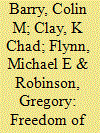|
|
|
Sort Order |
|
|
|
Items / Page
|
|
|
|
|
|
|
| Srl | Item |
| 1 |
ID:
123623


|
|
|
|
|
| Publication |
2013.
|
| Summary/Abstract |
Nonstate actors, such as international non-governmental organizations (INGOs) and multinational corporations (MNCs), have attained an increasingly prominent role in modern world affairs. While previous research has focused on these actors' respective interactions with states, little attention has been paid to their interactions with each other. In this paper, we examine the extent to which the decisions of private actors seeking to invest abroad are affected by the reputational costs of doing business in countries publicly targeted by human rights activists. We find that ''naming and shaming'' by human rights INGOs tends to reduce the amount of foreign direct investment received by developing states, providing evidence that INGO activities affect the behavior of MNCs. An additional implication of our findings is that shaming by INGOs can impose real costs on targeted states in the form of lost investment.
|
|
|
|
|
|
|
|
|
|
|
|
|
|
|
|
| 2 |
ID:
159578


|
|
|
|
|
| Summary/Abstract |
Why do minor powers ever resist the demands of major powers? Although recent work has begun to provide answers to this question, we argue that research has missed a vital piece of bargaining dynamics in dyadic research: third-party influence. Using spatial modeling techniques with the Militarized Interstate Dispute and International Crisis Behavior datasets, we improve upon previous models of asymmetric conflict by showing that the presence of a neighboring rival of a minor power, and the relationship that rival has with a major power, conditions the likelihood that weak actors choose to fight the strong. The recent examples of Pakistan and Iraq, after the 9/11 terrorist attacks in the United States, serve as ideal types in which minor powers are respectively less and more likely to resist the demands of major powers. We find quantitative support that regional rivalries can act as both constrainers and enablers for minor powers when bargaining with major powers.
|
|
|
|
|
|
|
|
|
|
|
|
|
|
|
|
| 3 |
ID:
134151


|
|
|
|
|
| Publication |
2014.
|
| Summary/Abstract |
Allowing or restricting foreign movement is a crucial policy choice for leaders. We argue that freedom of foreign movement reduces the level of civil unrest under non-democratic regimes, but only in some circumstances. Our argument relies on the trade-offs inherent in exit and voice as distinct strategies for dealing with a corrupt and oppressive state. By permitting exit and thereby lowering its relative costs, authoritarians can make protest and other modes of expressing dissatisfaction less attractive for potential troublemakers. Liberalizing foreign movement can thus function as a safety valve for releasing domestic pressure. But the degree to which allowing emigration is an effective regime strategy is shaped by the economic opportunities offered by countries receiving immigrants. We find that freedom of foreign movement and the existence of economic opportunities abroad reduce civil unrest in non-democratic states. However, at high levels of unemployment in the developed world, greater freedom of foreign movement actually increases protest.
|
|
|
|
|
|
|
|
|
|
|
|
|
|
|
|
| 4 |
ID:
163442


|
|
|
|
|
| Summary/Abstract |
Which countries are likely to be ignored for their human rights abuses? This article focuses on one particular way that cases of human rights abuse might be overlooked by human rights organizations (HROs): the relative visibility of the state’s abusiveness vis-à-vis its geographic and social peers. HROs are more likely to target abusive states that are located in regions with more HRO resources and/or are surrounded by states that demonstrate higher respect for human rights, as these abuses will stand out much more clearly. Further, human rights treaties can be used by abusive states as a form of strategic “social camouflage,” with states trying to minimize the risk of HRO attention by ratifying human rights treaties to look more like their rights-respecting peers. Using a cross-national time-series research design, this article finds much support for the argument: abusive states that “join the chorus” avoid HRO attention.
|
|
|
|
|
|
|
|
|
|
|
|
|
|
|
|
| 5 |
ID:
158990


|
|
|
|
|
| Summary/Abstract |
Are economic sanctions an effective tool for the improvement of global human rights practices? Imposed economic sanctions seem to lead to increased target state repression. However, governments still impose sanctions for the expressed reason of the target's poor human rights practices. If sanctions are detrimental to the enjoyment of human rights, why do governments continue to use them in response to state repression? I argue that sanction activity may improve human rights practices in (1) states threatened with human rights–based economic sanctions and (2) nontarget states whose perceived cost of repression is increased by the example set by target states in their human rights and foreign policy peer groups. Using data on 159 countries from 1981–2005, I demonstrate that, while imposed sanctions are related to worsened human rights practices in target states, threatened human rights sanctions are related to increases in government respect for human rights in both target states and others whose human rights practices and foreign policies are similar to those of target states.
|
|
|
|
|
|
|
|
|
|
|
|
|
|
|
|
| 6 |
ID:
176041


|
|
|
|
|
| Summary/Abstract |
Most cross-national datasets of civil and political rights practices have relied on internationally distributed English language secondary sources as the core source of information for their metrics. This approach has yielded data that are highly reliable, but also suffer from the fact that their information sources under-represent the overall level of abuse internationally and do so in a way that is biased across countries. The combined knowledge of the individual human rights practitioners working to directly monitor the abuses occurring within a country would likely serve to overcome much of this biased under-reporting, but it is difficult to compare that knowledge across country and cultural contexts. In this article, we discuss how we overcome these problems in the Human Rights Measurement Initiative (HRMI) civil and political rights data. Using an expert survey that contains anchoring vignettes in concert with Bayesian scaling techniques, we present a new methodology for collecting and aggregating data on the intensity and distribution of respect for eight separate civil and political rights.
|
|
|
|
|
|
|
|
|
|
|
|
|
|
|
|
|
|
|
|
|